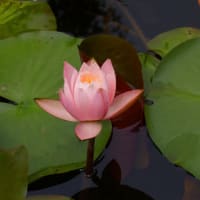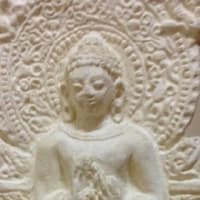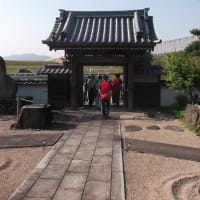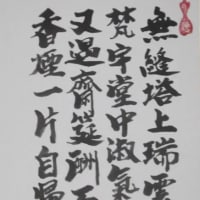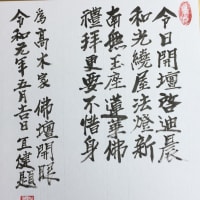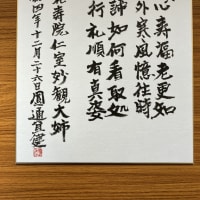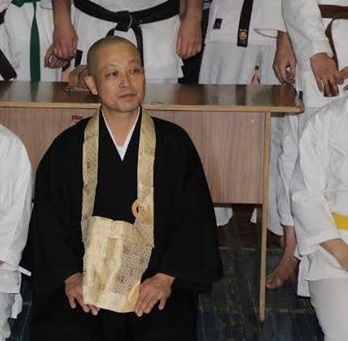
‘Better to walk than to talk’
8) There is four ways of to look at things like as to see, to observe, to inspect, to perceive.
Incidentally, to see means seeing with the naked eye. To observe means Avalokitesvara’s observation, is what to see in view of hart. So, to observe means to see with the heart eye minutely. To tell the truth, we able to notice real feature distinctly by to observe.
9) Musashi Miyamoto said that he would see or observe with his eyes. As he mentions, only the eyes of observation can learn the secrets of Japanese fencing. He insisted on observation and conformed that the eye of mind was the most important training for the Japanese fencing. But it is also important to do business, study, and everything else, not just only Japanese fencing in Japan. Meantime, the most important thing is to see by eye of mind.
10) It should be attention that the character is Gyo which means practicing Prajunya Pramita. It is heavily important this character. I did not dare anticipate Goethe’ words. Generally speaking, the soul of religion is better to walk than to talk. Well, the religion should not talk, should walk. Moreover, Gyo means this practicing. Practicing means to walk, to carry out.
11) Buddhism teaches three types of wisdom in short. Those are the wisdom to hear, the wisdom to think, the wisdom to practice.
First, listening wisdom simply means wisdom that can be heard from the ear. That is a little wisdom. That is certainly wisdom. But it cannot say the truth wisdom.
Second, the wisdom to think means the wisdom gained by thinking. It is the wisdom to reconsider and judge the wisdom of hearing again. That is the wisdom that is being considered.
In addition, the practicing wisdom means to grasp by practicing. You can get it by practicing yourself. Therefore, this is the religious area. That means it is better to walk than to talk.
12) Let us chant Hannyashin sutra by our own hart and learn it by body practicing. Let us practice the religion of it not just only knowledge of the philosophy voluntarily.
13) First, let me talk about the story of ‘Five components‘. This word was translated from the Sanskrit words Pañca Skandha. Pañca means five as a number. Skandha means an aggregate. Therefore, Buddhist scholar interpreted it as an aggregate and a component. Moreover, Five Component are always in motion themselves, not stopped. Sanskrit scholars translated it into movement. It is very interesting.
14) Materialism that explains everything in the world, Spiritualism that sees everything in the world as the focus of the spirit, they have a prejudice together. Buddhism does not approve them.
Buddhism has a basic view that subjectivity, objectivity, and everything that consists of collection of five elements. So, the so-called, the teaching of to be one with things and mind or denying separation the bodily shape and mind teach us the correct view of the world or life.
15) A complete expression of our language and thoughts is actually incomplete. We cannot easily talk about our thought and what we want to talk about. The miserable world and the most enjoyable heart cannot be expressed as it is by writing or speaking.
16) From ancient times, it has been said that Yuima’s silence is like thunder. The word of silence has big considerable meanings. Firefly which cannot sing suffer from love. It is said that you cannot cry when you are sad really. That is the saddest world. The saddest time is when tears do not come out.
17) When someone asks for the impression of drinking a cup of water, how do you respond about it? You cannot understand to taste water unless you drink it yourself. Whether it is delicious or not, spicy one or sweet one, you cannot decide to taste it. So, needless to say. Let us drink a cup of tea.
18) When you have had a child, you can understand the worries and joys of parenting before anything else, like that, you can thank not only your parents but also child simultaneously. Thanks to notice completely owing to child that child is most cute existence than others in the world. We must absolutely be grateful for the love of our children, the joy of acting altruistically, and is taught the unselfishness through parenting children.
19) Behind just one word of ‘emptiness’ is actually a vast and profound teaching. The emptiness of word is fully incorporated into the profound philosophy of Buddhism. This is the extract of Buddhism.
20) Avalokitesvara directly experienced the profound emptiness. One who truly understands emptiness and devotes himself completely to emptiness is undoubtedly alive Avalokitesvara. Hence, at least we need to discover Avalokitesvara in our own figure and find ourselves into Avalokitesvara.
Translated by Giken yoshitomi
●坐禅会 毎週土曜日午前6:25~8:00
久留米市宮の陣町大杜1577-1圓通寺
初心者歓迎 参加費無料
詳細は電話でお問い合わせください。0942-34-0350
初回参加者は6:15までに来てください。
●学校やクラブなど団体研修 坐禅申し込み随時うけたまわります。
出張も致します。
費用はご希望に応じます。宿泊はありません。
久留米市宮の陣町大杜1577-1圓通寺
初心者歓迎 参加費無料
詳細は電話でお問い合わせください。0942-34-0350
初回参加者は6:15までに来てください。
●学校やクラブなど団体研修 坐禅申し込み随時うけたまわります。
出張も致します。
費用はご希望に応じます。宿泊はありません。












